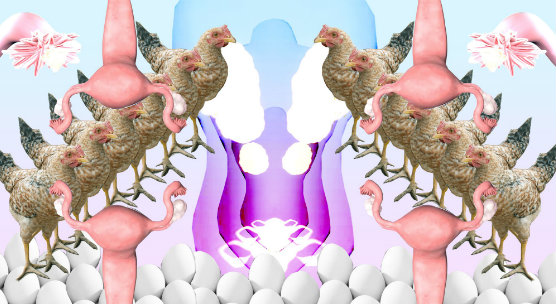‘hormonal’ – exhibition of art and science considers importance of oestrogen
Published On Wed 2 Mar 2016 by Grant Hill

Internationally renowned feminist activist artists Guerrilla Girls are bringing their attention-grabbing work to the University of Dundee for an exhibition taking place as part of the Women in Science Festival.
The exhibition, ‘hormonal’ opens at LifeSpace Gallery on Thursday, 3rd March and brings together work by international women artists. The title of the exhibition refers to the hormone oestrogen, the subject of the works and of the exhibition.
Hormones are a crucial part of our biology, sending signals between organs and tissues for the functioning of our body’s systems. Oestrogen is a commonly prescribed hormone for contraception and in hormone replacement therapy (HRT), usually to ease uncomfortable symptoms such as sweats and headaches as levels naturally decline during the menopause.
Oestrogen is not very different, at the molecular scale, from testosterone, the so-called male sex hormone, but the amounts our bodies produce naturally is different, at different stages in our lives, and they play different roles in our development.
The Guerrilla Girls’ project “Estrogen Bomb” (2008) advises those on hormone replacement therapy to send any extra oestrogen pills to world leaders as a way of getting them to tone down what they see as testosterone-fuelled war-mongering.
The Guerrilla Girls, an anonymous activist group, wear gorilla masks for public appearances and use banners, billboards, posters, stickers and other media campaigns to draw attention to the ongoing lack of a gender balance in society, particularly in the arts.
Curator Sarah Cook said, “The Women in Science festival has given us a chance to open up a discussion about chemical compounds in our environment (how they’re made, used, and what residues they leave behind) as well as about the role women play in both art and science.
“The exhibition addresses one of the most commonly prescribed hormones, oestrogen, which is crucial in development, in regulating our systems in digestion, in sleep, in having healthy bones.
“Yet, these three artists all take very different approaches to understanding oestrogen – socially, politically, technologically – and that is one of the strengths of this show. We have to continually fight gender discrimination – not just when the word ‘hormonal’ is used as an insult to women for being led by their emotions – men can be hormonal too!”
American artist and biological scientist, Mary ‘Maggic’ Tsang is showing her provocative civic bioscience work, “Open Source Estrogen (Housewives Making Drugs)” (2015), in which she imagines a future where women (including those transitioning from male to female) use DIY tactics to make their own oestrogen drugs in their kitchen at home.
Juliette Bonneviot, a French artist based in Berlin, is exhibiting her Xenoestrogen series of paintings. The paints used were created by the artist from objects found in the environment, from soya beans to plastic, which contain xenoestrogens, a form of the hormone which mimics oestrogen itself and can have hormonal effects.
The exhibition also considers how understanding the way oestrogen works in the body has been invaluable in the generation of important technologies used by scientists to study the function of our genes. Researchers have engineered ways of turning genes on or off only in particular cells and tissues, and at specific times.
This technology has been used by Professor Doreen Cantrell, of Dundee’s School of Life Sciences, to study the metabolism and migration of cells of the immune system. This is furthered by recalling the groundbreaking work of Dundee obstetrician Dr Margaret Fairlie, who pioneered combining surgery and the use of radium to treat ovarian cancers, some of which, like breast cancer, are now treated with hormonal therapy.
‘hormonal’ runs at LifeSpace until April 23rd and the gallery is open every Saturday from 11am-5pm.
For media enquiries contact:
Grant Hill
Press Officer
University of Dundee
Nethergate, Dundee, DD1 4HN
Tel: +44 (0)1382 384768
Mobile: 07854 953277
Email: g.hill@dundee.ac.uk